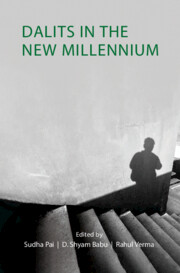Book contents
- Frontmatter
- Contents
- List of Figures
- List of Tables
- Acknowledgements
- 1 Introduction: Dalit Discourse in the New Millennium
- Part I Shifting Patterns of Electoral Politics
- Part II Popular Culture, Discourse, and Protest
- 7 Music as the Language of the Bahujan Movement: Locating the Social History of the Dalit Shoshit Samaj Sangharsh Samiti
- 8 Anti-Caste Music and Cinema
- 9 Portrayal of Dalits in the Media: A Study of Select Newspapers from Uttar Pradesh
- 10 Hierarchy in Protest: A Comparison of Dalit and Upper-Caste Agitations
- Part III Transformations in Ideology and Identity
- Part IV Aspirations and Anxieties
- Part V Discrimination and Representation
- About the Contributors
- Index
7 - Music as the Language of the Bahujan Movement: Locating the Social History of the Dalit Shoshit Samaj Sangharsh Samiti
from Part II - Popular Culture, Discourse, and Protest
Published online by Cambridge University Press: 12 July 2023
- Frontmatter
- Contents
- List of Figures
- List of Tables
- Acknowledgements
- 1 Introduction: Dalit Discourse in the New Millennium
- Part I Shifting Patterns of Electoral Politics
- Part II Popular Culture, Discourse, and Protest
- 7 Music as the Language of the Bahujan Movement: Locating the Social History of the Dalit Shoshit Samaj Sangharsh Samiti
- 8 Anti-Caste Music and Cinema
- 9 Portrayal of Dalits in the Media: A Study of Select Newspapers from Uttar Pradesh
- 10 Hierarchy in Protest: A Comparison of Dalit and Upper-Caste Agitations
- Part III Transformations in Ideology and Identity
- Part IV Aspirations and Anxieties
- Part V Discrimination and Representation
- About the Contributors
- Index
Summary
Popular culture is an important parameter for understanding contested spaces within society. Stuart Hall (1996: 4) argues that identities are formed and contested within ‘specific historical and institutional sites within specific discursive formations and practices’. He further argues that cultural studies are not just an ‘umbrella’ term for knowing anything and everything; it is rather about understanding the new popular culture in the context of ‘the larger historical or political project that now confronts the humanities’ (Hall, 1990: 23). This chapter contextualizes the emergence of the Dalit Shoshit Samaj Sangharsh Samiti (DS4) in Dalit–Bahujan sociopolitical history, by engaging with the musical tradition and practices of the ‘Bahujan mission’.
Music is an important aspect of this popular culture. Within the sociopolitical movement of the Bahujan, led by Kanshi Ram, musical practices and performances have played a significant role in raising anti-caste consciousness. It is relevant to mention here that the relationship between popular cultural practices and political movements cannot be compartmentalized neatly, because they are not mutually exclusive. There has been constant overlap between what is popular culture and how the political sphere uses elements of the ‘popular’ from time to time.
When one investigates the ‘practice’ of music, every form of music has its history and is associated with an ethnic group (Bohlman, 1991: 266–67). Music is a shared consciousness through which cultural history is reiterated and retold. This shared consciousness and culture are reflected through the song's dialect, the materiality used, the lyrics of the song, and so on. Thus, every form of musical practice has its context and history. However, music has the potential to transcend the essentialized identity within which it is conventionally embedded as well. Simon Firth (1996) has argued that while the social context of music is relevant, it is also important to understand how music has the potential to travel beyond conventional boundaries of identity. Within popular culture, music can be seen as a cultural aspect that creates a contested space with the existing popular culture, both by appropriation and denunciation of aspects that exist in mainstream popular culture.
- Type
- Chapter
- Information
- Dalits in the New Millennium , pp. 115 - 132Publisher: Cambridge University PressPrint publication year: 2023
- 2
- Cited by



